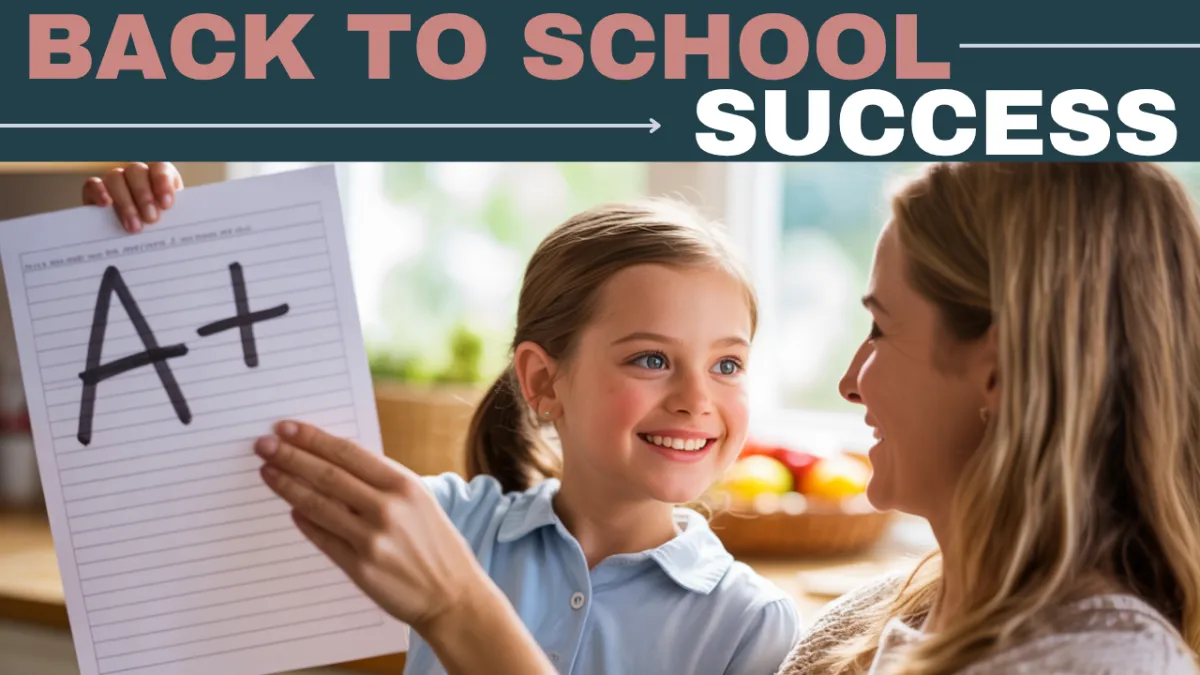
Your Back-to-School Routine May Have Surprising Academic Benefits, Psychologists Say


Do you ever wonder if you're preparing your child for back-to-school in the best way? You may be surprised to hear that your back-to-school approach can influence your child's long-term success—not just this year, but decades down the road.
Research shows that the way we prepare our kids can lead to very different academic outcomes and even career opportunities in adulthood. The best part? You can make small, intentional changes now that have a huge impact later.
As a psychologist and mom of four, I follow five steps every fall to set my kids up for school success, based on my 5 C’s Parenting Framework. Let’s dive in.
1. Communication
Most parents either avoid conversations about back-to-school nerves or they jump into “fix-it” mode for every worry their child expresses.
When you dismiss concerns with “You’ll be fine” or try to solve every single issue, you can actually block your child from building coping skills and emotional resilience.
Instead, promote open communication:
Ask how they feel about starting school
Listen without interrupting
Validate their feelings, even the nervous ones
Share stories from past years when they overcame similar worries
Example:
To a kindergartner: “Tell me what you picture when you think about your new classroom.”
To a high schooler: “What’s going through your mind about starting at the new school?”
Remind them it’s normal to feel a bit nervous—this “fear of the unknown” can actually motivate them to prepare more responsibly.
2. Consistency
Psychologists call it behavioral rehearsal—practicing routines in advance so your child feels confident and prepared.
Too many families wait until the night before school to think about schedules and supplies. This leads to tired, disorganized kids who start the year feeling behind.
Instead:
Mark the first day on the family calendar
Shift bedtimes gradually a week ahead
Organize backpacks, lunchboxes, and study spaces together
Do a practice morning routine to reduce first-day stress
Reconnect with classmates or carpool friends before school starts
When kids rehearse the routine, they start day one feeling ready and excited—not overwhelmed.
3. Choices & Checkpoints
The balance between independence and support is key. Some parents do everything for their kids, others expect complete independence before they’re ready—both can backfire.
Offer manageable independence with built-in checkpoints:
Let a 6-year-old choose whether you walk them to class or say goodbye at the door—practice both
Practice biking to school with a 12-year-old before letting them go solo
Help teens create visual checklists for mornings or after-school routines
This “scaffolding” lets your child feel capable while knowing you’re there for support.
4. Positive Consequences
Most parents think of “consequences” only as punishment. Instead, focus on positive reinforcement for the behaviors you want to see.
Notice and comment when your child:
Expresses excitement about learning
Organizes school materials without prompting
Shares what they learned at school
Examples:
“I love hearing how curious you are about science this year.”
“I noticed how you got organized for tomorrow—that’s exactly the kind of responsibility that pays off.”
These aren’t empty compliments—you’re reinforcing the exact traits research shows predict long-term success.
5. Check Yourself
Your child watches how you approach learning. They notice if you genuinely value curiosity—or if it’s just something you say.
Model what you want to see:
Read where they can see you
Learn new skills or hobbies
Discuss interesting things you’ve discovered
Show curiosity about their school topics
Example: “I was reading about renewable energy and it made me think about what you’re learning in environmental science.”
When kids see you living the value of lifelong learning, it becomes part of their own mindset.
The Takeaway
You’re not just preparing your child for first grade or freshman year—you’re building the foundation for their lifelong success, career achievement, and even future financial stability.
The key is intentional parenting:
Communicate openly
Create consistent routines
Offer independence with support
Reinforce the right behaviors
Model curiosity yourself
Small changes now can make a lasting difference. Start this back-to-school season with these five strategies, and you’ll be giving your child more than just a good first day—you’ll be giving them the skills and mindset to thrive for life.
